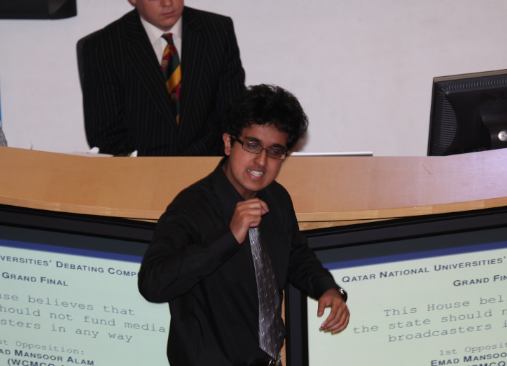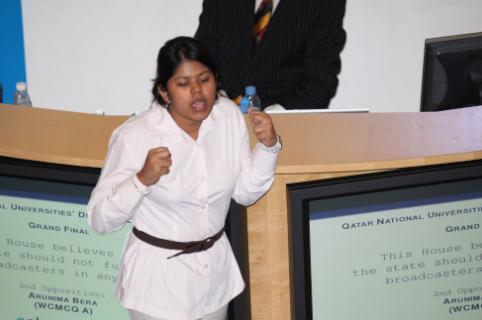Debate Culture Taking Root at WCMC-Q
Debate team wins second consecutive Qatar National Universities Debate Championship
May 2009

Emad Mansoor Alam presented and summarized the opposition argument
against the motion that "the government should not fund broadcasters
in any way."
For the second year in a row, students on the Weill Cornell Medical College in Qatar debate team have won the Qatar National Universities Debate Championship. Opposing the motion that “the government should not fund broadcasters in any way,” WCMC-Q students were judged by visiting representatives of the Oxford Debating Union to have maintained the strongest argument according to debating rules and culture.
“It was challenging, but as one team we have a very good rapport among ourselves and that played a huge role in the win,” said first-year premed WCMC-Q student and debate club secretary, Arunima Bera.
The win means that the team can move on to the world debating championships in Turkey. But what’s perhaps more significant about it is the fact that the debate culture at WCMC-Q is clearly taking root. And it’s a culture and a state of mind that students say is extremely valuable.
“You always have to find a way to argue against what you believe in. As a doctor, we have to look at things ethically, so it’s great to look at things from two sides so you get that wide-range perspective,” said second-year WCMC-Q premed student and debate club member, Maha Al Ghafry.
Debate is a mental gymnastics of sorts—often times, teams find themselves arguing points that they’ve never considered before. Yet they have to relay to the audience, and the judges, that what they are arguing is stronger than the other side’s statements. Judges weigh a whole host of factors falling under the categories of style, content and strategy.
“You have to be able to sell ice to the Eskimos. No matter what you are debating, said Emad Mansoor Alam, first-year premed student and president of WCMC-Q’s debate club. “The moment that you go on the stage to speak, for those five minutes, you should be the most confident person on the surface of this earth.”
Under the rules of debate, however, confidence is easier discussed than done, especially for a new debater. A topic in a debate is usually assigned just 30 minutes before its presentation, and in this time, the three-member team must come up with a series of points without references or the Internet. As each team member stands up to speak in turn, their roles change from presenting and outlining points, to rebutting the other team’s points, to summarizing the entire argument based on what was discussed.
“The terms in which a debate takes place, the language that is used, the structure … it’s drilled in what they must do in order to fulfill their requirements in a debate as designed,” said Dr. Rodney Sharkey, professor of literature and debate coach at WCMC-Q.

Thinking on her feet, Arunima Bera rebutted arguments by the proposition
and continued the debate to help the team seal the win.
But the students say they love the structure and the pressure and even thrive on it as they gain experience.
“You know that feeling when you go to the gym or you’re on a football team and you win? For me, personally, it’s the same thing; you get that adrenaline rush,” Al Ghafry said.
“Often debaters must gather their thoughts to argue ideas they oppose,” Sharkey says. “It’s a practice that encourages detachment from personal points of view. And it’s a practice that at the same time puts the students in touch with their individual opinion as it exists in a larger context.
“It’s not a question of ‘well, do you believe what you’re arguing?’ It’s that you learn to argue sometimes that you don’t believe. And the benefit of that, the advantage of that, when it comes to meeting people or encountering people who have different views to you, you know where they’re coming from,” Sharkey said.
The WCMC-Q debate team is now 25 members strong, and Sharkey says it’s at a stage where the students will take over its management completely as it continues to attract and challenge incoming freshmen and seasoned members. Debates take place throughout the academic year and, when they are just between WCMC-Q members, revolve around different medical-related topics. These are free and open to the public.
Our members are in the club because they really want to debate, and I think their passion is something that drives this club,” Alam said. “We have a lot of debates, and in each debate our club has grown in terms of quality of the arguments and quantity of audience members.”
Report by Emily Alp
